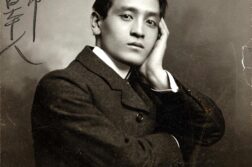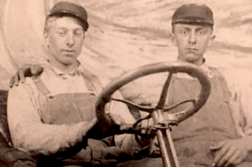IN 1925, when nineteen-year-old Klaus Mann had gained fame as the author of a scandalous play, a cartoon by Theodor Heine appeared in the Munich satirical magazine Simplicissimus. It showed an ephebic Klaus in short pants standing behind his illustrious father Thomas. One of the youth’s hands holds a sheaf of manuscripts, the other is laid daintily on the shoulder of his sour-looking sire, who is toiling away at a page full of crossed-out lines. The caption: “You must know, Papa, that geniuses never have geniuses for sons, so you must not be a genius.”
The joke was picked up by Bertolt Brecht, who remarked, “The whole world knows Klaus Mann, the son of Thomas Mann. By the way, who is Thomas Mann?” Such satire might seem to suggest that in Germany of the mid-1920’s Thomas, for all his eminence, was viewed as a relic of an obsolete era, the Age of the Bourgeoisie, while Klaus was accepted as the representative of Youth, the enigmatic, perverse, and unnerving rising generation. On the contrary, from the start of his literary career, the press disliked and distrusted Klaus Mann and ridiculed him as a Dichterkind, the offspring of a great writer incapable of emulating his father’s achievements.
Klaus Heinrich Thomas Mann was Thomas’s first male child, born in Munich in 1906, a year after his beloved sister Erika. Some of his artistic temperament was inherited from his mother Katia Pringsheim, who, as the Nazis were later quick to emphasize, had Jewish blood in her veins. Her father Alfred Pringsheim was a wealthy Jewish scholar and, paradoxically, a fervent proponent of Wagner. He became professor of mathematics at the University of Munich. He had married Hedwig Dohm, an actress whose father had founded the Berlin humor magazine Kladderadasch and whose mother was a pioneer of female emancipation. Katia Pringsheim was one of the first women in Germany to be granted a higher education.
Growing up in Munich under the influence of their art-loving grandparents, aloof and enigmatic father, and nurturing mother, the Mann children were soon singled out for their extraordinary appearance and behavior.
Laurence Senelick, professor of drama at Tufts University, is the author of The Changing Room: Sex, Drag and Theatre, among other books.






